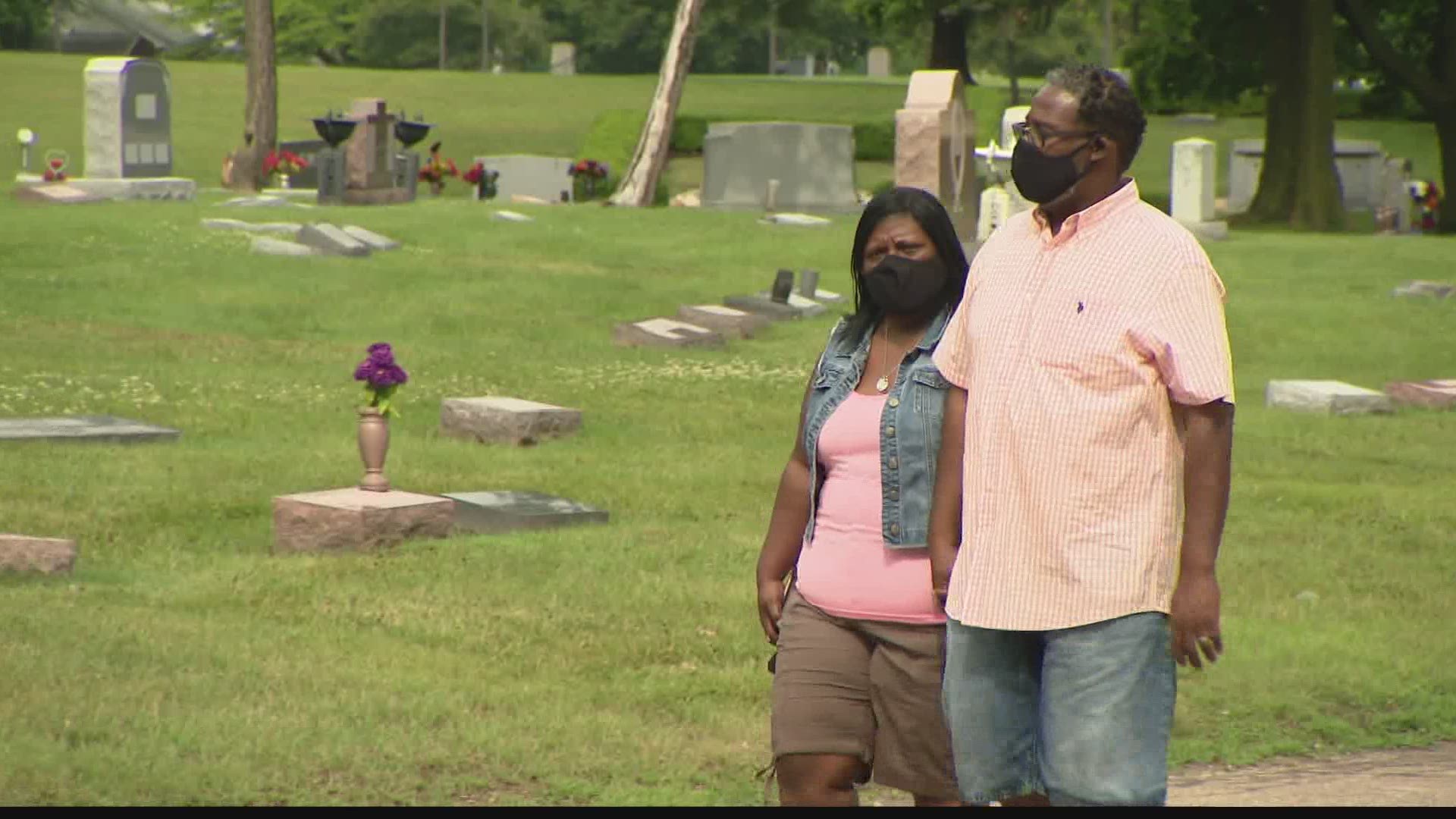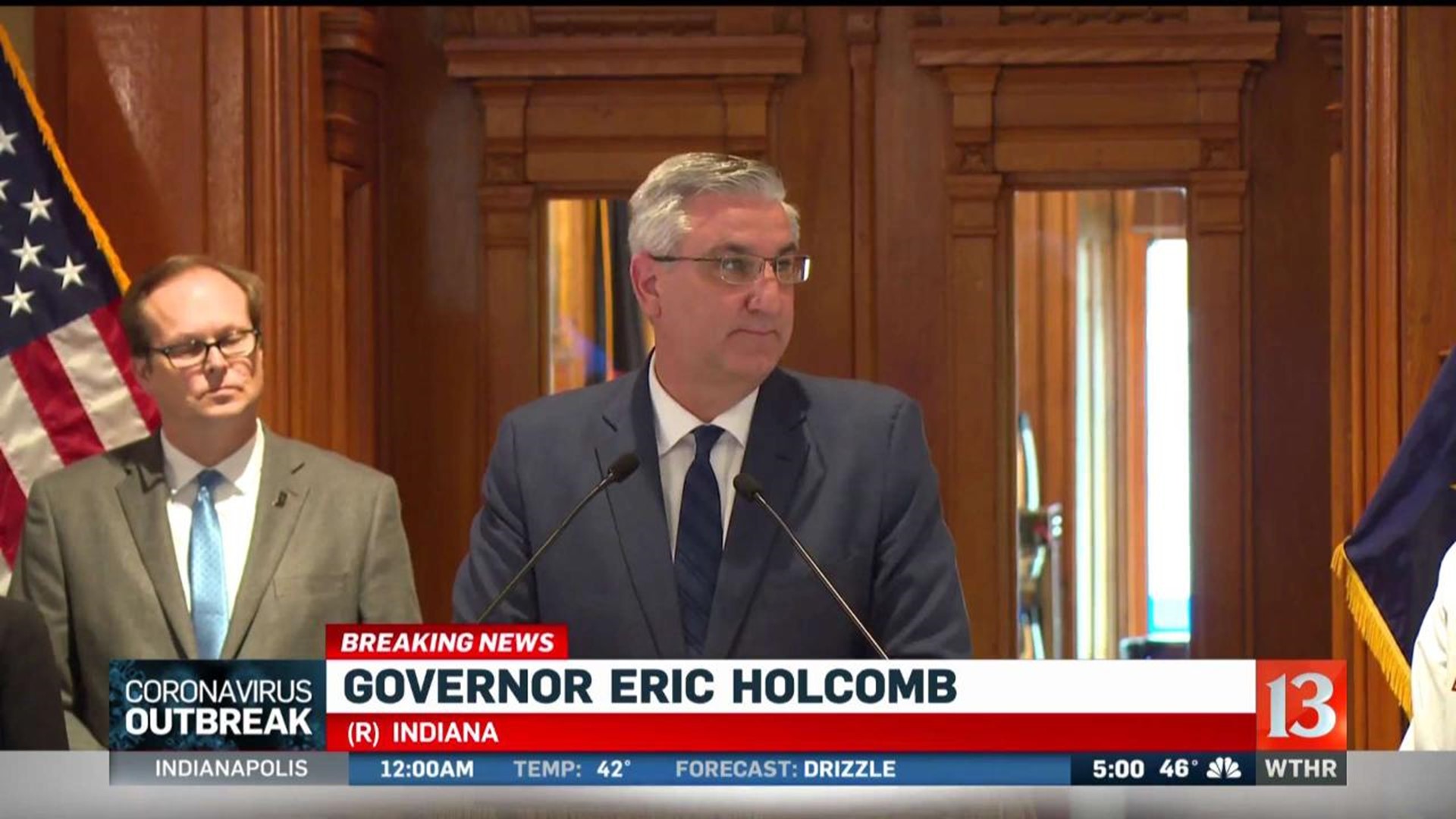INDIANAPOLIS — As Hoosiers regain more freedom after months and stages of shutdown, some disturbing accounts emerge from families who say their lives will never be the same.
For the first time, they're telling what really happened during those first dark days. Stories of deaths untold, when Indiana went to war against COVID-19.
The stories weave a picture of what was happening at Community East Hospital the week Indiana went under a Public Health Emergency.
"We as a state have lost our first Hoosier to the Coronavirus...COVID-19," said Governor Eric Holcomb on March 16. It was then he declared a declaration.
"We are, make no mistake about it, at war with COVID-19."
13 Investigates has learned that war began with testing failures, inaccuracies and more lives lost than told.
It started to unravel with the death of a Hoosier identified only as a patient over 60 with pre-existing health conditions.
13 Investigates would later learn her name was Roberta Shelton. She was known as "Birdie" to her friends at the Moose lodge in Beech Grove and to her love, 63-year old Tony Sizemore.
"She had just a big heart and would help anybody any way she could," said Tony.
"I was with that woman every day of her life!" he said proudly.
Every day for the six years he and Birdie were together, until nearly a week before she died.
"It's devastated my world," said Tony who spoke by phone.
He recalled the early Saturday morning on March 7, when he took Birdie to the emergency room with what they thought was a case of bronchitis. But unlike previous overnight stays in the emergency room, Birdie didn't get better. She couldn't breathe and was in excruciating pain.

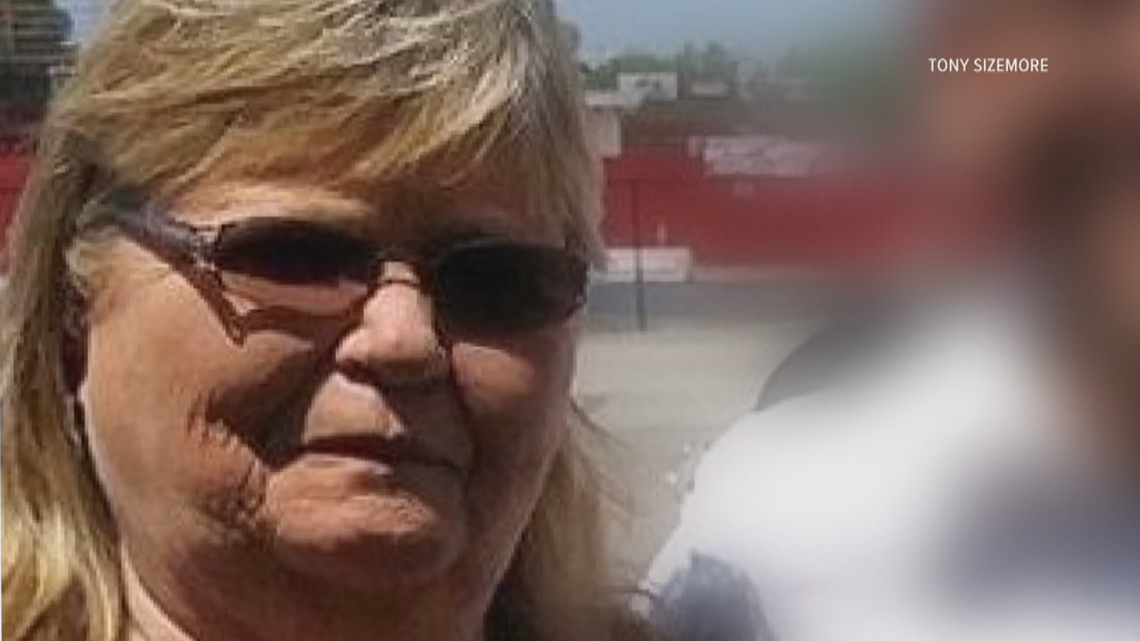
"I knew something different was going on," said Tony recalling the last time he saw his girlfriend. "They tested her and said she was positive for the virus."
Before he was sent home to quarantine, he remembered an eerie conversation with a doctor.
"He just seemed real nervous...and he asked me what she did for a living. And I told him that she transported cars for a rental company. He said, 'Everybody drives those cars.'"
Birdie was a driver at the Enterprise hub on West Washington Street.
A co-worker who asked not to be identified told 13 Investigates six drivers would load into a van to go pick up cars from other locations.
The insider said those who worked along side Birdie ended up sharing more than a ride. They were all reportedly coughing. But no one knew they had been exposed to COVID-19 until two days before Birdie died.
According to the Enterprise employee, four co-workers and three of their spouses also got sick.
And that's not all.
For the first time, 13 Investigates can confirm that three other drivers from Birdie's hub died weeks after she did, all of them positive with COVID-19.
A spokeswoman with Enterprise told 13 Investigates, "The four employees who passed away were part-time drivers at our local driver hub in Indianapolis."
In a statement, Enterprise Holdings said:
"Our hearts are heavy and our thoughts are with the families... We are sorry for their loss...
The reality that the COVID-19 world health crisis has impacted some of our own colleagues in such profound ways is truly devastating for all of us."
The company shut down that driver pool.
"I did not know that," said Dr. Ram Yeleti, chief physician at Community Health Network, referring to the number of deaths at Enterprise.
"We didn't know how quickly it would spread (or) who the virus would attack." he told 13 Investigates.
Yeleti was on the front lines of the state's response for several weeks, until he himself contracted and recovered from COVID-19 in late March.
"If the supply chain of testing was better we would have had a much different outcome," admitted Yeleti, who blamed the state's lack of test kits on a logjam at the Centers for Disease Control. He also wants to see Indiana bring in more point-of-care testing to get quicker test results.
The insider at Enterprise told 13 Investigates they requested testing, but were denied.
So was Tony Sizemore.
"I wasn't tested and never been tested to this day," said Tony, who is angered by the fact that health officials didn't provide a test, considering his daily contact with Birdie.
No testing and, according to Tony, there was no touching goodbye with Birdie either, despite a beautiful account he and his family learned was recited during that March 16 press conference livestreamed across the state.
"This individual's significant other was also infected. So the two of them could not be together when this patient passed, we had to do iPad conferencing so these two could see each other," Yeleti had said.
"That's not true at all," Tony revealed. "From the time they said she was tested positive, I never seen her, never spoke to her," he said, surprised by the story that had been shared.

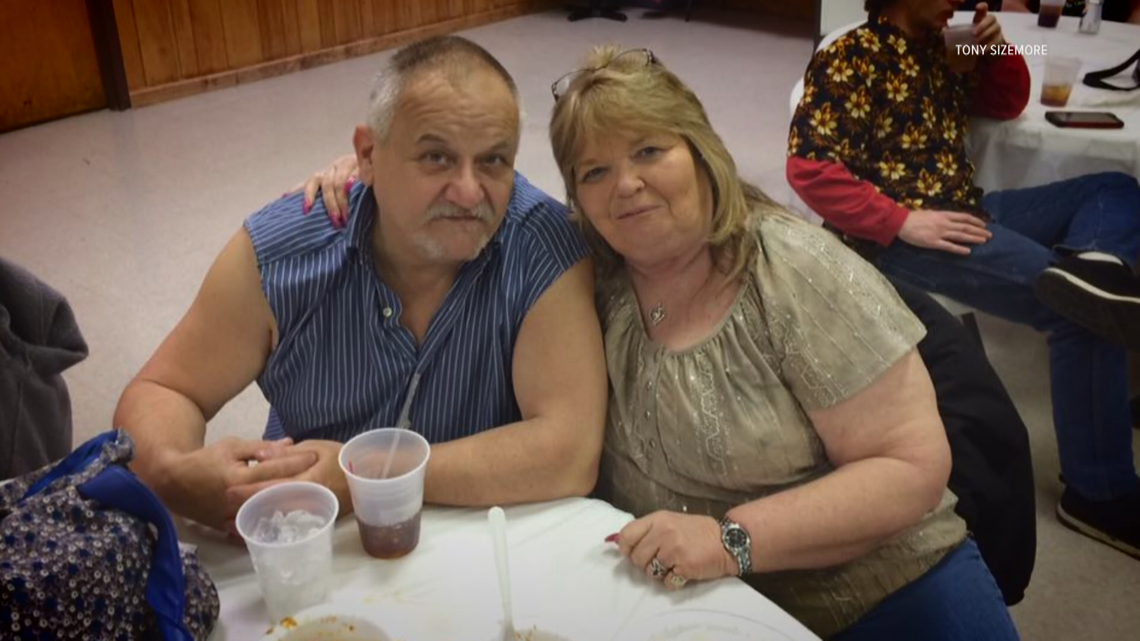
According to Tony, hospital staff had asked if he could dial in to call, but he says he wasn't even sure how to connect. Yeleti told 13 Investigates he was not present when the patient died, and can't remember the specific details that were relayed to him.
Tony lives with his grief and now even more questions.
He said the virus that claimed his "Birdie" isn't even officially acknowledged on her death certificate.
"It states she died of pneumonia. I personally think there's more people dying of it. They're not putting it on their death certificates," said Tony.
He's not even convinced Birdie was the first Hoosier to die from COVID-19.
Based on data from the Department of Health, the state might agree.
The data shows the first COVID-19 death on March 15, the day before Birdie died.
ISDH told 13 Investigates, "March 15 is the earliest death reported" and that "Deaths are classified as being due to COVID based on information on the death certificate."
It's not always listed as the cause of death.
13 Investigates has also learned the Marion County coroner, the State Department of Health and Community were all on alert after an unidentified doctor on the front lines of the COVID unit at Community East died at home on March 15.
13 Investigates learned his name was Dr. Marques Bolden, a promising 35-year old, seemingly healthy hospitalist.
Those who knew Bolden were stunned.

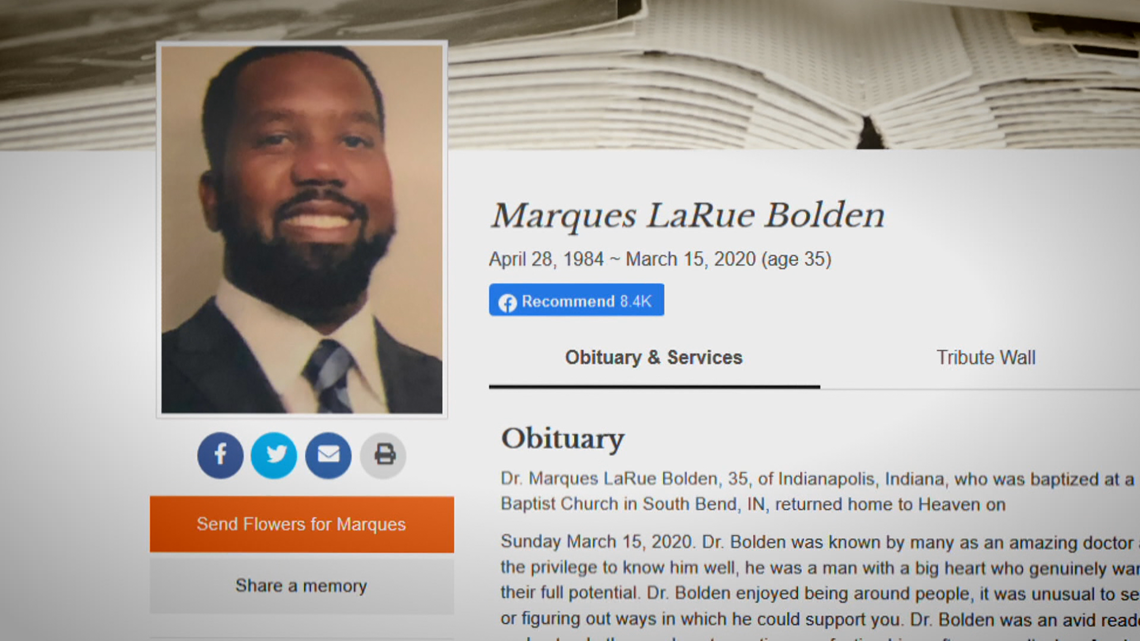
According to the Marion County Coroner's Office, Bolden "was suspected to have COVID." He was tested at some point after his death and that test came back negative.
"The State Department checked that out, yes. He did not succumb to COVID-19. It's a fact he did not have COVID-19 when he passed. That was not the cause of death," Yeleti insisted.
Autopsy findings 12 weeks later revealed Dr. Bolden died from an intracranial or brain aneurysm due to hypertensive cardiovascular disease.
"I just think we were trying to be thorough at the time," said Yeleti, who believes some COVID-related deaths are being missed.
"I do think the number of deaths is vastly underestimated," he said.
New York researchers are now looking at COVID-19 related deaths in young people that might be masked by other health conditions including stroke. Deaths are especially common with underlying risk factors like high blood pressure and diabetes.
In Marion County, a 32-year-old heart attack victim is also suspected of dying from COVID-19.
13 Investigates met his parents near his gravesite at Crown Hill Cemetery.
The grief is still fresh LaTonya and Leonard Hiser Jr.
On March 20, their son, Leonard Hiser III, affectionately known as "Tre," died after being transported to the emergency room at Community East.
Tre had a history of asthma, but had not been having any flare ups.
Four days earlier, he had spiked a fever and went to a MedCheck seeking a COVID-19 test.
"He was denied help. He was sent home and told to go quarantine. Two days before his health further deteriorated, she said he told her, "Mommy this hurts."
Nothing could prepare the family for the news to come.
Hours after arriving at the ER, Tre suffered a heart attack and died. Doctors suspect it was brought on by COVID-19.

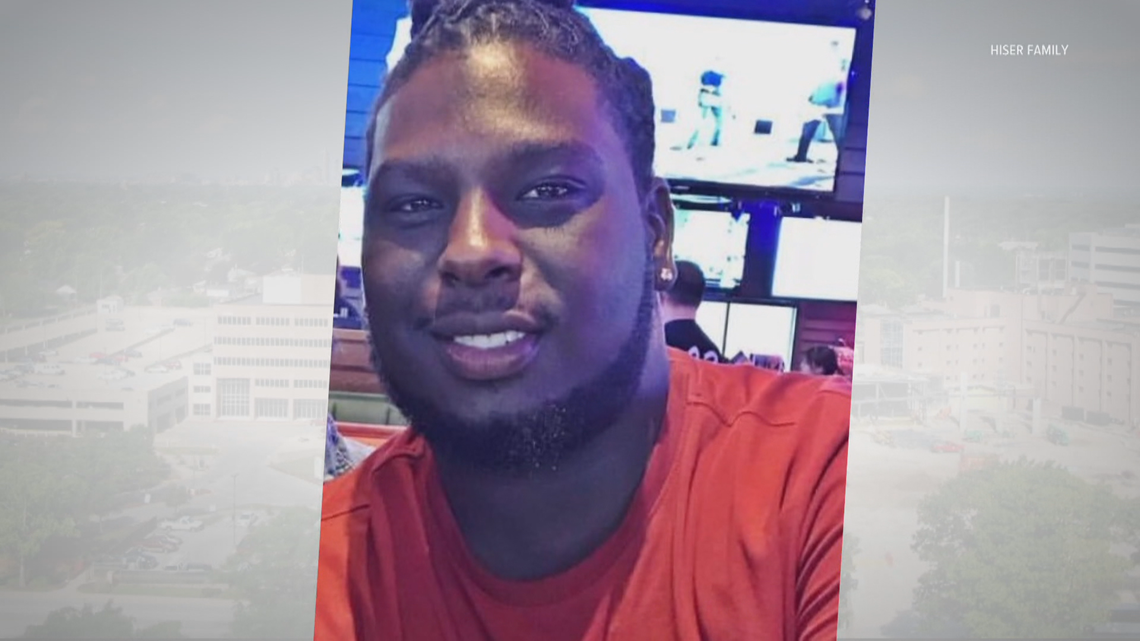
He finally got a test after he died. That was something he couldn't get when he was alive.
"It's was quite a shame that there was no test available. My child died alone. That's heart-wrenching. Only God is keeping our minds," she said.
And there was more devastating news. Just talking about it caused LaTonya to break down sobbing.
Indiana did not include Tre's case in it's initial COVID-19 death count. For months, they waited to see the data include a 32-year-old in Marion County.
"It just took my soul out because I kept saying, 'Let them know it's for young people also," said Leonard Hiser Jr., choking back tears as he consoled his wife.
"I want people to take this serious," said Tre's mother, vowing to stand in the gap for other grieving families.
"You haven't heard the last of me...It's not okay," she said.
COVID-19 is listed as a contributing factor on Tre's death certificate. ISDH will only say the state's earliest "probable COVID-19 deaths" occurred on March 20, the same day Tre died.
The state now lists 192 "probable" deaths related to COVID-19. It's unclear how many more cases there could be prior to the state declaring an emergency.
Both the Hisers and Tony Sizemore want the state to take more precautions.
"The fact that they want to open up schools?" questioned LaTonya Hiser. "We don't have it together as adults."
The families say masks, more testing, personal protective wear and new drugs like remdesivir are a start. But they welcome more time to reopen the state.
They know losing a loved one is forever.

